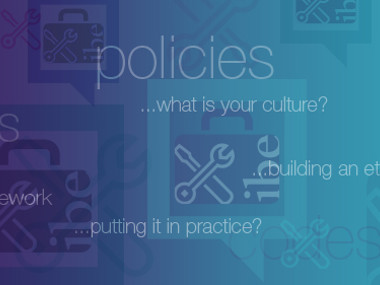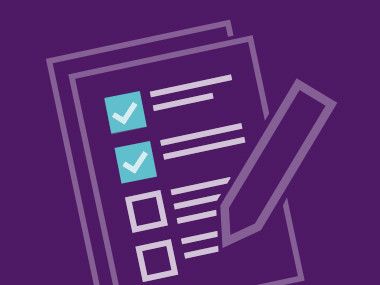Discuss with the team
Ethical values (personal, professional and organisational) are the compass by which we live our lives. Especially if you work in a smaller organisation, you may feel very close to the company’s values: you know your staff and you feel you can trust them to ‘do the right thing’ when they find themselves in difficult situations.
However, explicitly encouraging your employees to consider the implications that those values have in the practical decision-making process and training them to include ethical considerations in their daily work will help to make sure that your core values are embedded throughout your organisation. Moreover, it will reinforce trust among your staff that everyone in the organisation will ‘do the right thing’, making clear what standards of behaviour are expected.
What determines your ethical values?
The sources of ethical values that your business and your employees are exposed to are multiple and varied.
- Each of us has personal values that guide us in the choices we make – in the workplace or outside. Our family, our upbringing, our faith and our culture are all factors that influence our personal values.
- In addition to that we all should abide by the values of the profession we have chosen (just think of what it means being an architect, an accountant, a doctor). For many professions, these values are formally defined by a professional body to govern how members of that profession are required to behave in carrying out their professional duty. In other cases, professional values may be implicit but are equally important (just think of the importance of good and fair customer service for those working in the hospitality sector, for example).
- Finally, there are societal values, which are formalised through the laws and regulations of a country and represent the shared system of beliefs that shape that given society.
These are all value sets that will have an influence on your organisation: taking them for granted is a risk. In particular, it is important to identify whether there might be any tensions between, for example, the personal values of your employees and the values you want to promote as an organisation. Such tensions can lead to serious problems for you and for your organisation. Setting your core values explicitly, in a collaborative way with your employees, is one way of minimising this risk.
When do ethical dilemmas arise?
We think about ethics when we are faced with a dilemma. Dilemmas arise when we are faced with either:
- A clash between two different sets of values which influence our choices and behaviours. For example between religious, professional and corporate values sets, or
- A choice between two rights (a choice between right and wrong is not really a dilemma!). For example values hierarchy, split loyalties and short-term/long-term gain.
Ethical dilemmas can arise when there are tensions between the core values of the organisation and an employee’s personal or professional values or when an employee perceives that the management is not acting in line with the company’s stated values. Lack of alignment between stated corporate values and company practices breeds cynicism and disengagement, creating a vicious circle of unethical behaviour. A company may say, for example, that it is open, but in reality, when staff question strategies or processes, they face a closed door.
Within each values set, dilemmas can also arise because of different priorities within those values. So for example, a dilemma may arise where there is a conflict between the personal values of loyalty and professional success, or helping a friend versus providing for one’s family. When faced with an ethical issue, other factors such as time and financial considerations as well as priorities in relationships can have an impact on the decision-making process.
On this page you can find examples of the conflicts which can arise between different sets of values, such as personal and corporate ones, and the competing hierarchy of such values. Use these dilemmas to promote the debate within your organisation and to encourage your employees to discuss ethics matters.
Loyalty challenged
You are a middle manager.
One of your good friends works in the same company as well. Yours is a close friendship, dating back to university. Your two families socialise together and you often talk shop, keeping each other abreast of developments in your respective teams in the company.
Restructuring is taking place throughout the company. You are a member of a working group that will ensure that the internal communications policies fully support the changes that will take place in the course of the restructuring.
As a member of the working group you know about plans for the restructuring. This information is confidential and it is available only to a few people apart from top management. This includes information about the proposed selling off of one part of the company, which is no longer seen as a core business.
It is the part of the company where your friend works.
You are sure that there are bound to be redundancies at all levels, especially of those who are middle managers, the level that your friend is now at.
He has recently been talking about moving house, taking on a substantial new mortgage arrangement in the process, and being able to send his daughter to a special school for children with learning disabilities.
What do you do?
- What is the ethical issue?
You have a conflict between your company values of respecting the confidentiality of company information and personal values of loyalty to your friend. There are also potential issues of any contractual obligations against divulging information, which could also cause insider trading. You also have the competing hierarchies of providing information about the redundancies to one friend and not to other colleagues. - What is your dilemma?
You could tell your friend in confidence (and hope that they keep that confidence, or you risk losing your job); or keep the information to yourself and risk losing a friend. - What are your options?
One option could be to declare your conflict of interest to your manager and say that you are uncomfortable with being a member of the working party because your friend may be affected. You could seek permission to warn your friend not to increase his spending at this current time.
Workplace gossip
Val overhears François gossiping over lunch with his friends.
“Our department’s like a Soap Opera!” he gasps. “That girl, Bella, she’s just started here, and already she’s dating the Team Leader! Now I’m not one to gossip, but some of us are concerned she’s getting preferential treatment. Y’know – if she’s late he doesn’t tell her off or dock her hours, or if she wants a day off he lets her have it.”
“It’s bound to end in tears, these things usually do,” says one of François’s friends. “Octopus hands, we call him in our department.”
François and his friends see that Val is listening and change the subject, but Val is concerned; Bella is young and has only just started at the call centre, and as far as she knows their Team Leader is married.
Val notices that François and his gang continue to snigger whenever they see Bella, and she wonders if she should say something to them. It’s probably idle office gossip; anyway, what people do in their private life is their own business.
What are Val’s options?
- What is the ethical issue?
There are several issues that play out in this scenario. There are considerations to be made around fair treatment of employees and equal access to opportunities: is it true that the team leader gives preferential treatment to some team members? The value of respect seems also to be challenged in this case, both in terms of the team leader’s attitude towards female members of staff, and of how rumors and gossip are spread in the office. - What is Val's dilemma?
Could she ignore what she’s just heard hoping that this will sort itself out (but knowing that it rarely does); or should she raise her concerns? But to whom? Is there a risk for her in doing so? - What are Val's options?
A first thing to think about is to talk to François and find out more about what he has just said. Was it just gossip? Is he aware of instances of inappropriate behaviour from the team leader towards other members of staff? Should Val discuss this issue with her line manager or another appropriate person within the organisation?




